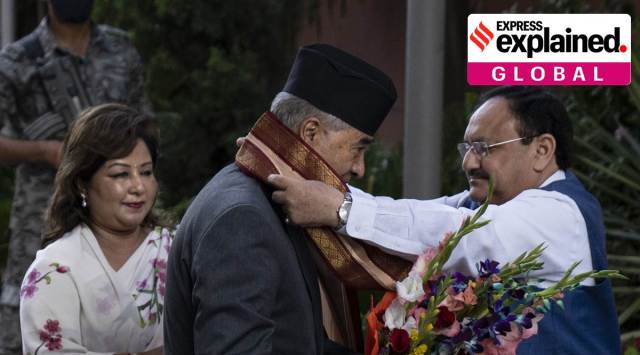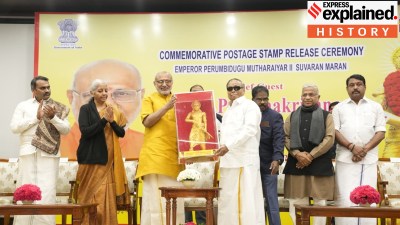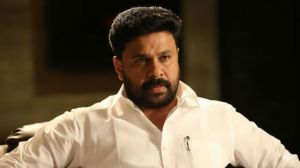Explained: What Nepal PM Deuba’s visit to BJP headquarters means for his party
Nepal Prime Minister Sher Bahadur Deuba began his tour of India by visiting the BJP headquarters. Nepal Foreign Minister Narayan Khadka said Deuba’s visit to the BJP office was in his capacity as Nepali Congress chief.
 Deuba visited the BJP headquarters at the invitation of party chief J P Nadda.
Deuba visited the BJP headquarters at the invitation of party chief J P Nadda. In a deviation from practice, Nepal Prime Minister Sher Bahadur Deuba began his just-ended tour of India by visiting the BJP headquarters, triggering criticism back home, although some have defended him too.
According to Nepal Foreign Ministry sources, during any official or state visit by a Prime Minister at the invitation of their Indian counterpart, the standard practice is to pay courtesy visits to the President and Vice President, hold talks with the Prime Minister, and then meet dignitaries including ministers, officials and politicians from the ruling as well as the opposition parties.
Deuba visited the BJP headquarters at the invitation of party chief J P Nadda. “Has Deuba gone to New Delhi in his capacity as the President of the Nepali Congress, or as Prime Minister” said Bhim Rawal, a former deputy PM and leader of the opposition Communist Party of Nepal-Unified Marxist Leninist.
Nepal Foreign Minister Narayan Khadka said Deuba’s visit to the BJP office was in his capacity as Nepali Congress chief.
Nepali Congress & India
The Nepali Congress was founded 76 years ago in India by some Nepali students, most of them involved in India’s freedom struggle. After India became independent, Indian socialists including Jayaprakash Narayan and Ram Manohar Lohia participated in the Nepali Congress-led struggle for multi-party democracy, which was achieved with India’s mediation in February 1951.

In December 1960, King Mahenda dissolved the elected Parliament and introduced a panchayat system under his direct supervision. With Indian socialists going through a series of splits, the Congress remained the only informal ally of the Nepali Congress.
In 1990, when Chandra Shekhar led an all-party Indian delegation to Nepal to extend moral support to the revived movement for democracy, the BJP was not part of it. In 1992, the BJP was the only Indian party to send delegates under the leadership of ideologue K R Malkani for the national convention of the Rastriya Prajatantra Party, which was not comfortable with a multi-party democracy and reduced role of the monarchy.
Maoist insurgency, which aimed to transform Nepal into a republic, got the endorsement of political parties including the Nepali Congress and major communist groups with the mediation of Indian establishment in 2005. Nepal not only became a republic but was also declared secular.
In India, many BJP leaders favoured Nepal remaining a Hindu kingdom and a monarchy. Between the 2006 change and now, various ruling parties in Nepal have continued to interact with the Congress in India, even after the BJP came to power.
Hindu agenda
In Nepal, there are over six dozen organisations that occasionally come to the streets, but rarely together, demanding restoration of Nepal’s status as a Hindu kingdom. There is also a sizeable presence of the Hindu Swayamsevak Sangh, the Nepal chapter of the RSS. Among the parties in Parliament, Rastriya Prajatantra Party was the only one demanding restoration of Hindu nation and monarchy, but chose to join the communist parties’ government led by K P Oli.
Yet no party can afford to ignore the Hindu agenda in a country that has an over 86% Hindu population and was once the world’s “only Hindu country”. Oli, for example, has been campaigning on the plank of the “actual Ayodhya” in Nepal’s Madi, claiming this was where Lord Ram was born.
New equations
Oli’s two tenures as PM were marked by confrontation with India’s BJP government, first leading to India’s economic blockade, and then over the boundary issue. He moved closer to China, signing framework agreements on trade, transit and infrastructure. China also played a role in bringing the major communist parties — Maoists and UML — together to form the Nepal Communist Party.
Months after the Oli government collapsed leading to Deuba taking over in June 2021, the BJP’s foreign affairs in-charge Vijay Chauthaiwale found a rakhi sister in the Nepal PM’s wife, Arzu Deuba, who is seen as wielding influence in the party, administration and an NGO. Now, Deuba’s visit to the BJP headquarters is being seen as an initial success for the BJP in bringing the “secular” Nepali Congress closer to it. This comes in the wake of a distance growing between Nepal and China as the former signed a deal with the US for a $500 million grant from the Millennium Challenge Corporation.
Also, Uttar Pradesh Chief Minister Yogi Adityanath hosted Deuba to an elaborate puja and lunch in Varanasi before his return to Kathmandu. Public opinion on Adityanath is divided in Nepal. While he has substantial followers — more in his capacity as the mahant of Gorakhnath Peeth than as a political leader — pro-change activists and leaders, including former deputy PM and Nepali Congress vice president Bimalendra Nidhi, have been critical about what he stands for.
Before 2006, Nepal in general and the monarchs in particular used to revere Gorakhnath as their presiding deity. The Gorakhnath peeth owns substantial property in Nepal, and Adityanath has been openly in favour of Nepal’s continuance as a Hindu monarchy.
Newsletter | Click to get the day’s best explainers in your inbox
- 01
- 02
- 03
- 04
- 05






































